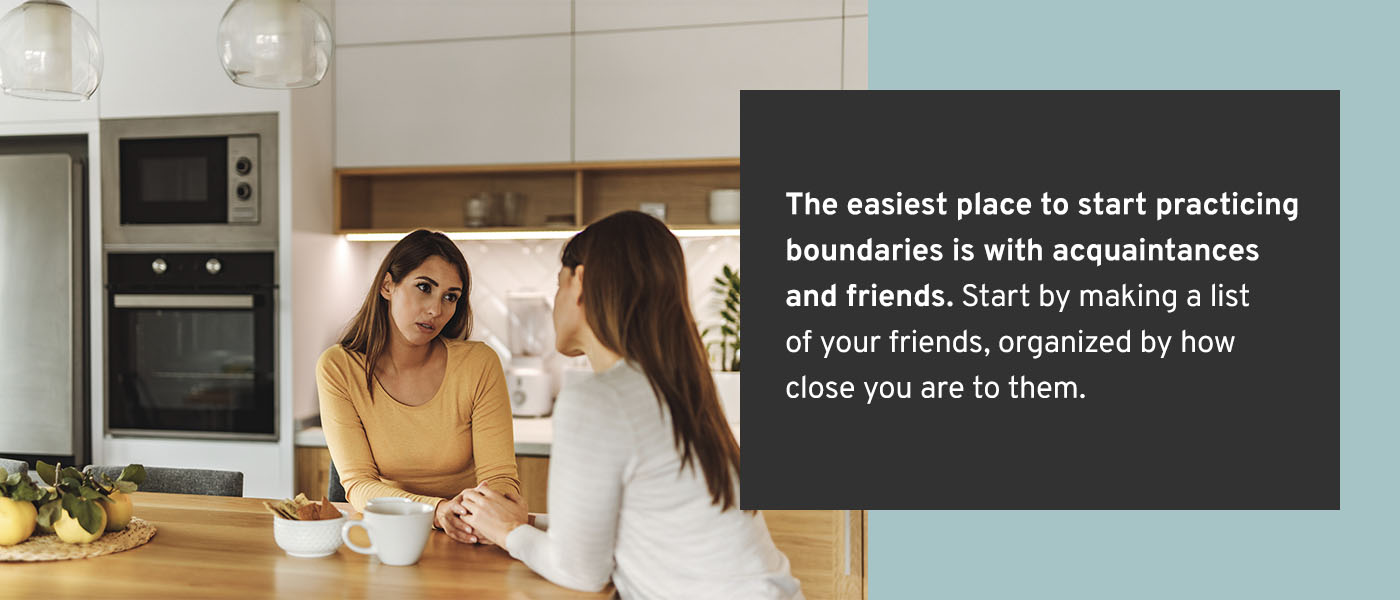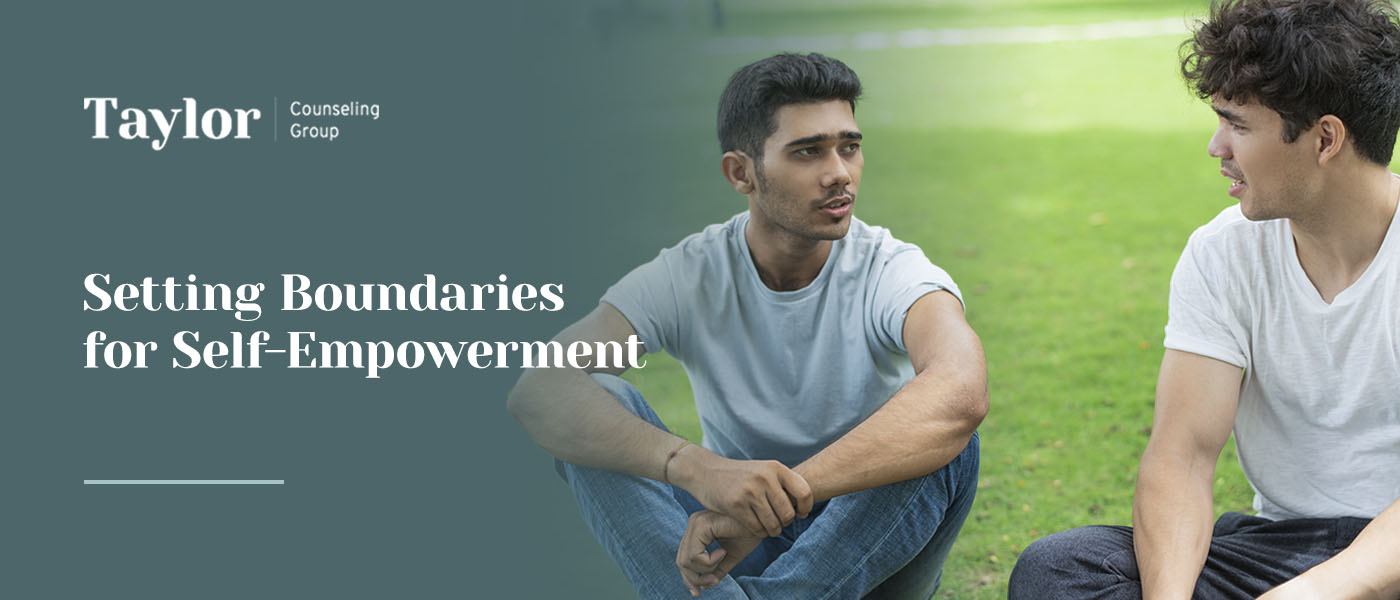Do you consider yourself a giver, peacemaker or people-pleaser? Many people who are kind, compassionate and empathetic focus primarily on caring for those around them. While being caring is wonderful, it can be taken too far.
If you find yourself exhausted, frustrated or feel poorly treated by others, it may be from a lack of healthy boundaries. Reasonable boundaries ensure you get the care you need so you can live from a place of abundance instead of running on empty. Setting boundaries is one of the best ways to improve your self-esteem and relationships.
Table of Contents
- What Are Personal Boundaries?
- How Do Boundaries Impact Self-Esteem?
- How Healthy Boundaries Impact Relationships
- Improve Your Boundaries With Taylor Counseling Group
What Are Personal Boundaries?
Boundaries are our ways of making sure that we are comfortable and safe in any given situation. They can exist in multiple situations, such as home, work, relationships (both with yourself and with others), and with things that are considered immaterial, such as your time.
Whether you’re the one issuing or receiving a boundary, it’s OK to feel uncomfortable when first getting used to them. After all, the relationship as you know it is changing. That said, the boundary being in place is not a bad thing — it simply requires a mindset shift and recognizing that boundaries aren’t about the things you say “no” to but what you can now say “yes” to.
Many people struggle with setting boundaries because they are wary of pushback or disagreement. People often overextend themselves to make others comfortable or maintain an image of someone who is likable or easy to be around.
Here is an example of recognizing your needs but not setting a boundary with how you spend your energy and time, as well as how this could play out:
- Your partner wants to go to a rodeo this weekend, followed by a late night out. You’ve had a long week and don’t like rodeos. You had planned to spend the weekend resting and recovering.
- You agree to go to the rodeo because you don’t want your partner to think you are a killjoy or no fun.
- You attend the rodeo, pretend to enjoy yourself and are more exhausted on Monday because you did not say “yes” to the rest that you needed.
Setting boundaries with others involves stating your truth and making space for your needs, even when you’re afraid of the other person’s response. Boundaries innately involve open communication around what is necessary for you and recognizing that only you are responsible for making sure your needs are met. When you let other people take responsibility for their own emotions, the only emotions you have to manage are your own.
Healthy relationships require open communication and honesty in all aspects, and letting your voice be heard safely is a crucial component. While explicitly stated boundaries are one way to open the conversation, being able to discuss and explore compromises is another.
Returning to the example above, you might have told your partner that you had a long week and the rodeo isn’t something you enjoy when you don’t have the energy for it. You could offer an alternative way to spend time with them that weekend, suggest a raincheck or ask to meet them for a night out after the rodeo ends. This says, “I see you and your want to spend time together, but I am prioritizing my needs first.”
How Do Boundaries Impact Self-Esteem?
If your relationship with yourself is unhealthy, it’s likely that your other relationships will be too. People with low self-esteem often don’t stand up for themselves, even in small ways, because they don’t think their own opinions and feelings are as valuable as those of others.
One of the best ways to start rebuilding your sense of self-worth is to get to know yourself. Here are a few questions you can ask yourself to get started:
- What do you like and dislike?
- What are your values and priorities?
- If no one was around to judge or disagree with you, what would you change?
Your thoughts, opinions and feelings tell the world about you — and if you don’t share them, if you don’t show up as yourself, other people are going to miss out. Stating your boundaries isn’t the same thing as disrespecting others’ wants and desires.
Do Self-Care Boundaries Mean I’m Selfish?
Many people worry that boundaries are a form of selfishness — after all, you’re putting your needs before someone else’s when you set a boundary. What’s important to remember is that you’re not infinite. You are already living within predetermined boundaries because you’re a human being.
You need sleep, downtime, healthy food, movement and supportive relationships to function well. Setting boundaries around your well-being means creating a foundation from which you can live generously.
Remember that when you say “yes” to something, you’re always saying “no” to something else. Here are some examples so you can see this in action:
- When you say “yes” to dog sitting for your neighbor, you’re saying “no” to free time in the early morning and evenings.
- When you say “yes” to making dinner, you’re saying “no” to an extra hour of work.
- When you say “yes” to staying up late on Friday night, you’re saying “no” to an early Saturday morning.
Using this principle of “yes” and “no” can help you make better choices. Setting boundaries doesn’t mean you have to say “no” to everyone all the time. They are a tool to help you foster a full and enjoyable life.
How Healthy Boundaries Impact Relationships
When you start to practice healthy boundaries, your relationships will change in one of two ways. Either they’ll significantly improve as others adjust to your new decisions, or they’ll end because people aren’t OK with the changes you’re making.
Although this might sound terrifying, it’s actually a good thing. When you lose unhealthy relationships, you make room for new, healthier friendships. Finding friends who support your boundaries is possible and incredibly affirming.
Friend Boundaries

The easiest place to start practicing boundaries is with acquaintances and friends. Start by making a list of your friends, organized by how close you are to them. Consider how much time you spend together and how vulnerable you are with them.
Next, consider how your friends make you feel. Is there something you’d like to change? Create a plan for how you’ll bring that up the next time you’re together. You’ll likely have to repeat your boundary because it can take time for people to remember and change their behavior.
If they don’t change how they treat you after you’ve asked them several times, it’s time to enforce your boundary. You can either communicate that you won’t be giving them the same access to you as before, or you can just act on that decision without explaining it.
Partner Boundaries
Enforcing new boundaries with a romantic partner can be more challenging because the relationship is more intimate. Although changing your patterns of behavior may be difficult, it’s still very possible.
The way your partner reacts when you express a boundary will tell you a lot about the quality of the relationship. If they’re offended, turn the problem back on you or refuse to listen, the relationship probably isn’t sustainable.
It’s much better to be alone and open to meeting someone new than to stay in an unhealthy relationship. When you start making healthy choices, people with healthier relationship patterns will be attracted to you.
Family Boundaries
Many people learn to set boundaries — or not to set them — in their families of origin. If one of your parents struggled to set boundaries, was extremely restrictive or felt boundaries were selfish, you may have picked up on that narrative and still live by it today.
You can improve family relationships by setting new boundaries, but it may take time. These long-standing relationships won’t change easily, and in some cases, your family members may be unwilling to make changes at all.
Be patient and stay focused on your goals. Setting boundaries with family will improve your life 100% of the time, but the outcome may look different depending on your family member’s response. If you’re uncertain about the best boundaries to set, you can talk them over with a trusted friend or counselor.
Improve Your Boundaries With Taylor Counseling Group
Learning to handle boundaries with maturity can drastically improve every area of your life. When you respect yourself, other people will too. You’ll be protected from the people who refuse to respect you, your career may improve and your sense of life satisfaction will increase.
Ready to work on your boundaries? At Taylor Counseling Group, we help individuals and families who are struggling with boundaries, low self-esteem or interpersonal relationships. Make an appointment today through our online client portal!







